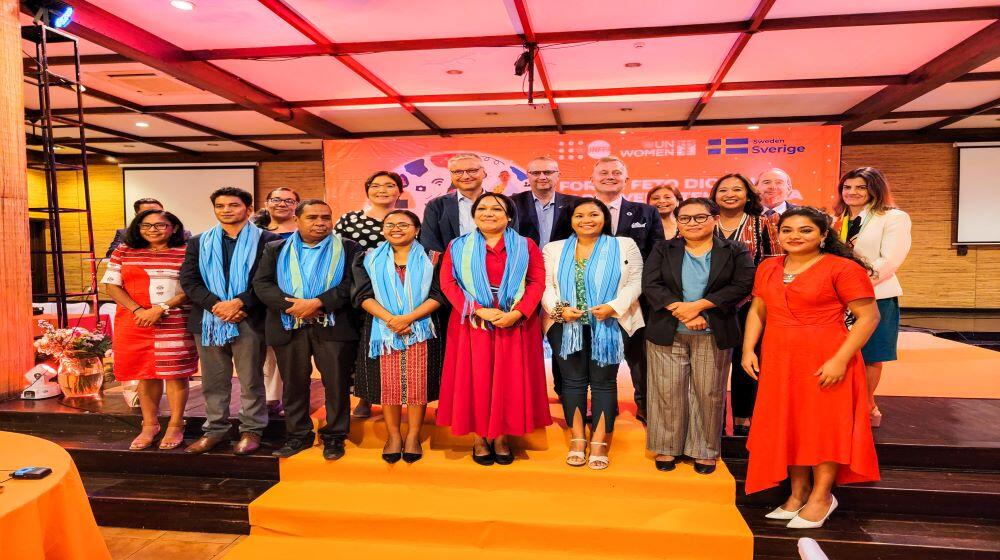Dili, March 10, 2023 – As part of International Women’s Day (IWD 2023) commemoration in Timor-Leste, marked globally on March 8, UNFPA and UN Women organized Women Forum “Leveraging Technology for Gender Equality” to celebrate the contribution of women and girls in advancing technology and digital education.
The forum’s other objective was to promote inclusive and transformative technologies and innovations for advancing gender equality; including in ending gender-based violence, promoting women’s economic empowerment, equal access to justice and improving women’s participation in leadership and politics.
The event, held at Hotel Timor on March 9, brought together thought leaders and representatives from the National Parliament, line ministries in health, justice, education sectors, UN agencies, development partners and technology agencies among other participants.
The forum was in line with IWD 2023 theme “DigitALL: Innovation and Technology for Gender Equality” which aligns with the upcoming 67th Session of the Commission on the Status of Women (CSW-67) themed “Innovation and technological change, and education in the digital age for achieving gender equality and the empowerment of all women and girls.”
Technology has the potential to foster economic growth and to expand access to education, information and knowledge; and to give voice and power to those furthest left behind and those whose voices were not traditionally heard; thereby enhancing participation in public life and democratic processes.
Although digital innovations can promote gender equality and women empowerment, they can also widen the gender digital gap -- particularly to women and girls.
UN Women Head of Office, Ms. Amy Nishtha Satyam, during her closing remarks, reiterated the significance of the continuous promotion of gender equality and women’s empowerment.
“Timor-Leste should step forward and strive to expand the dialogues on gender-transformative technology, enventually, increasing accessibility and equity in public service delivery for all. Indeed, it is critical that these changes should be accompanied by policies that remove the barriers of social norms and ensure women's participation in the digital economy and electronic governance.” said Ms. Amy Nishtha Satyam.
In Timor-Leste, progress has been made towards the promotion of gender equality and the empowerment of women and girls. For example, increasing women’s representation in decision making roles at national level, the number of women engaging in the field of technology, the existence of women’s engineering group, and the laws, policies and programs that the National Government has implemented in the past decade to promote equal rights -- regardless of sex or age.
However, there is still a wide gender gap in enrollment in the Science, Technology, Engineering and Mathematics (STEM) fields, access to digital technologies, and representation of women in leadership and decision-making roles.
According to the International Telecommunication Union (ITU), in the Asia-Pacific region, despite progress towards narrowing the gender gap, a 6% gender gap in internet usage persists.
Similarly, UN Women’s Gender Snapshot 2022 report warns that the loss emanating from excluding women from the digital world will grow from 1 trillion to 1.5 trillion by 2025 – from the gross domestic product of low and middle-income countries in the last decade if not addressed.
Additionally, while digitalization represents significant opportunity, it is also a space through which harm may be perpetrated. At least 38 per cent of women globally have personally experienced online violence and the rate is rising.
Certain groups of women are at a higher risk of technology-facilitated gender-based violence (GBV) because of what they do, who they are or if they access certain information and services.
This includes women journalists, politicians, women activists and feminists, academics and young people for example. Of those adolescent girls who do have access to digital technologies, 64 per cent are high users and are particularly vulnerable to technology-facilitated GBV.
UNFPA Regional Director, Mr. Björn Andersson, during his opening remarks, emphasized the need to prioritize the generation and use of data and evidence through digitalization and innovation, and the formulation of strategies to strengthen the digital safety and inclusion of women and women-led organizations for their meaningful engagement in social and economic development.
“It is important for governments to utilize and invest in digital technologies to tackle harmful gender norms and deep-seated inequalities while investing in young people and protecting the safety and rights of women and girls to express their voices.
"While digital innovations can promote gender equality and women empowerment, we must remain vigilant of the gender digital gap that technologies can create -- particularly to women and girls. Leveraging on digital innovations for gender equality requires a multi-sectoral approach,” said Mr. Björn Andersson.
Timor-Leste has celebrated International Women’s Day since 1976. This year, the Secretariat of State for Equality and Inclusion (SSEI) has also announced the national theme for IWD 2023 in Timor-Leste – “Women Ready to Lead” to promote women’s participation and leadership in politics, particularly in the upcoming Parliamentary Election, and to celebrate women leaders using technology and innovation to advance women’s role and voice in the decision-making.
Timor-Leste aims to accelerate all efforts towards harnessing digital transformation to benefit and empower those in vulnerable positions. In this sense, the IWD dialogue provided a multi-stakeholder platform for the strategic exchange of good practices and progressive measures to remove critical “digital barriers” facing women and girls in Timor-Leste.
For more information, contact:
Suleiman Okoth
Communications and Programme Support Specialist
United Nations Population Fund (UNFPA), Timor-Leste
Mobile: +670 75169796, Email; okoth@unfpa.org


